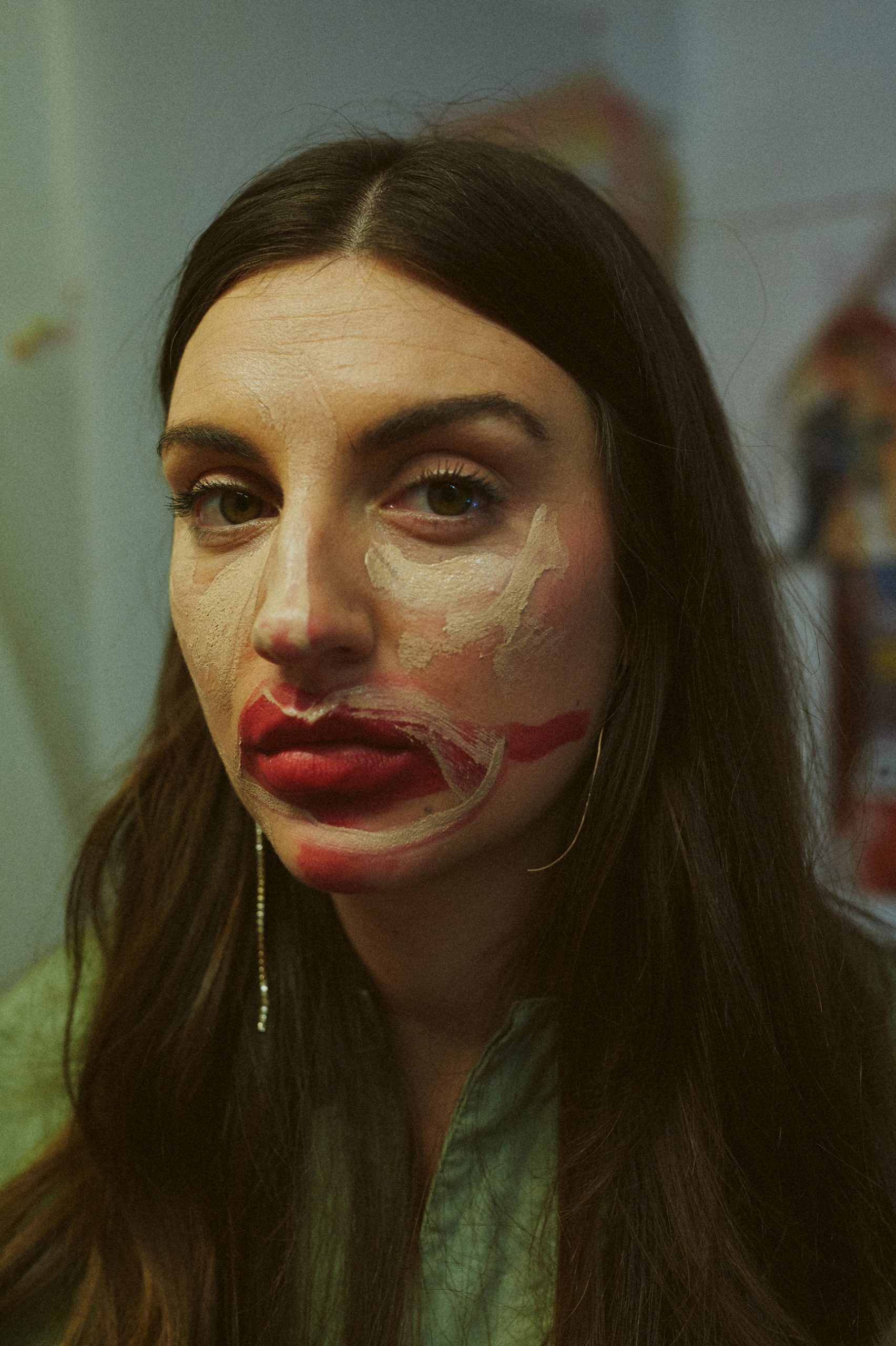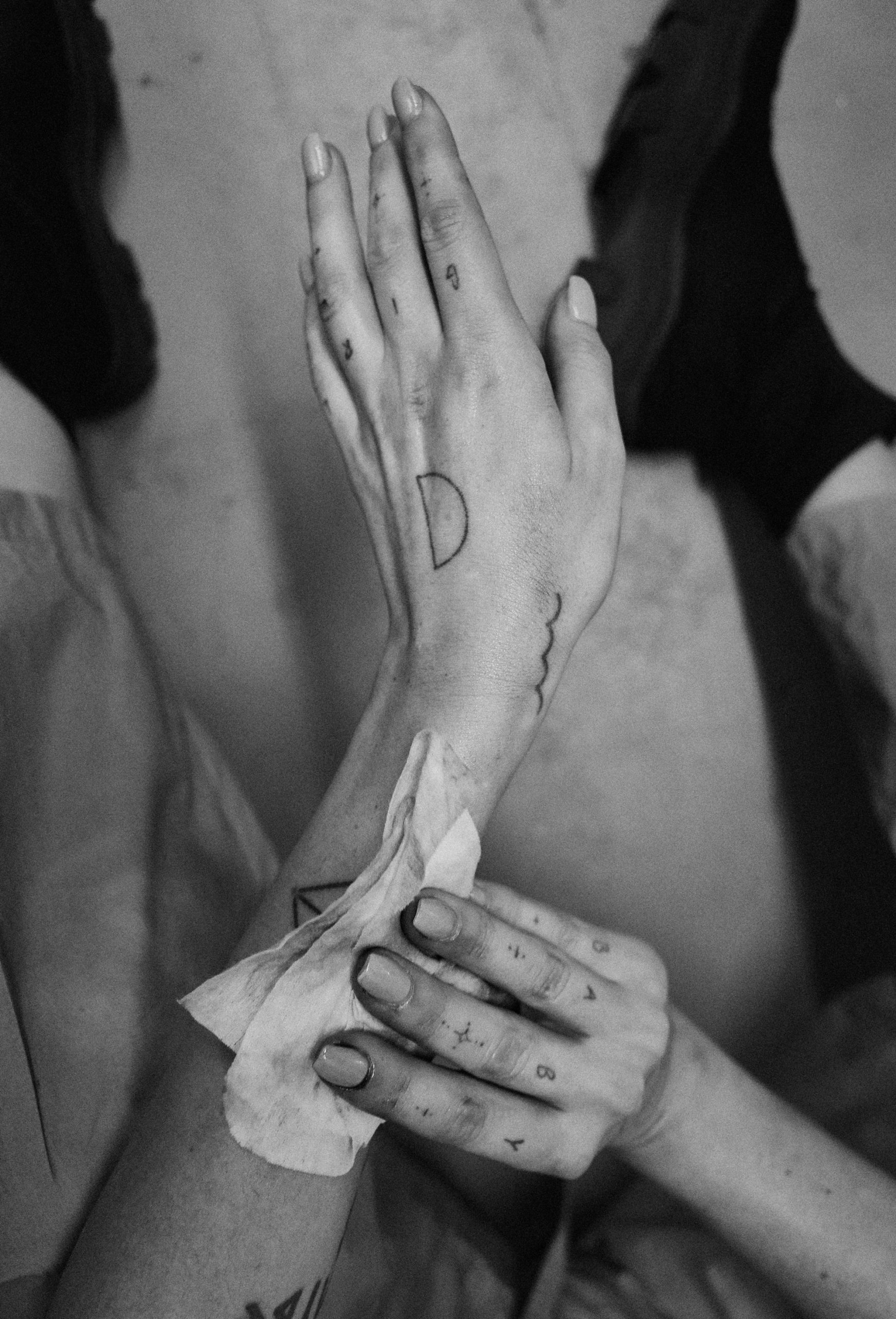CREATIVE DIRECTION + STYLING SIOBHAN LYONS | PRODUCTION ZOË ROBERTS
JESS WEARS DIOR | SPECIAL THANKS TO DIOR MAKE UP
CREATIVE DIRECTION + STYLING SIOBHAN LYONS | PRODUCTION ZOË ROBERTS
JESS WEARS DIOR | SPECIAL THANKS TO DIOR MAKE UP
Jess’ immaculate photographic portraits are veiled by gestural streaks of color, a style that has become her perpetual tour de force. As well as paint, she uses lipstick to mask and contort polished images, critiquing our constrictive standards of beauty and femininity. In examining our incessant quest for perfection, she blurs the lines between the performative and personal.
The speed and motion of her brushstrokes over each glossy photograph are explicit statements against our homogenous ideals of beauty. They at once express dynamism and vibrancy, rawness and aggression, softness and vulnerability. Violent and gentle strokes combined represent the multiplicity of the woman depicted in the image as much as the woman painting them — as do her kisses. In Jess’ Kiss Works, a tender peck is thrust into vehemence when applied as a means to distort. Whether she’s planting a kiss or smearing rouged pigment, makeup as a medium is an integral part of Jess’ practice. With a kiss, she creates a physical connection between herself and the image, amplifying the intimacy between herself, her subject and the intent of the piece. “We’re changing the way we use makeup, it’s moving into a more empowering space. People across many genders and identities are wearing makeup. It’s an artistic medium, it’s enhancement, it’s disguise all at once.” says Jess.
“We’re changing the way we use makeup, it’s moving into a more empowering space. People across many genders and identities are wearing makeup. It’s an artistic medium, it’s enhancement, it’s disguise all at once.”
Despite their subtle eroticism and amorous tenor, these portraits depict a type of anti-romance, a response to the romanticized ideals that have been constructed. “The ideals of men are my whole lived experience. It’s everything I know.” She ponders, “Are the things that I like all just for the eyes of a man? Am I allowed to like them? What about what I enjoy sexually and what I want to wear?” Abandoning stringent rules and antiquated narratives to make way for a new era epitomizes Jess’ art. “Diet culture is one of the main things that I think should be left in the past, that’s the thing I’ve almost killed myself trying to do. The idea that there are literally ideal measurements that a woman should fit into is just insane, then there’s facial symmetry and the length of our hair. Everything is measured.” The unpredictable fluidity of her work is a striking rebellion against these gendered quantifications.
“I grew up in Australia, close to the beach during 90s diet culture. So many brands would use dieting as an advertising technique, but it was still all centered around consumption. Even if we’re restricting ourselves, we’re filling this void with another product. My identity is built upon growing up in an irresponsible era, and what does that leave us with now?”
In a culture often hell-bent on tearing women down, musing on the future calls for a sanguine spirit. To gaze at what’s to come and conjure a paradisal society, a world that loves us, is often the only way forward. “When I hear women talking down to themselves, I hope they find a way out. Painting over a perfect image was my way out. I’m warping these images into the distorted versions we see in the mirror.” “You’re beautiful just the way you are”, she remarks. A truism her work both satirizes and affirms. “It’s your flaws that make you iconic. It’s as simple as that. I’ve never been able to express it with words, so I paint.”
I’ve always been so hyperaware of my physical appearance. It’s so ingrained in my systems of thinking, and it’s sewn a path so deep in my brain that it will always be there. But I can safely say that through painting and through constantly questioning it with art that I’m way kinder to myself now. My art helped me gain perspective and stop the pathways in my brain from continuing the same cycles, it helped me to break it.”
“When you look at history being predominantly run and organised by men, namely in terms of what women should look and think and feel like we’ve always been critiqued, we’ve always had to play into a system where we’ll be judged no matter what we do. We can do what we like, or we can stick to a set of rules, but we’re going to get criticized for it anyway,” Jess posits. “For so long we’ve been in this binary structure where we’re damned if we do and damned if we don’t, but now there’s so much more fluidity. You’re allowed to sit where you’re comfortable on that spectrum and whose right is it to tell you if you’re wrong or right?”
“If you’re not breaking rules, if you’re not ruffling some cunt’s feathers, then you’re not doing your job right.”
By rejecting the colonial, patriarchal gaze as the only valid lens, Jess represents the future wave of women and non-binary artists reclaiming the space where art, femininity and digital media intersect. Her recent exhibition at Rhodes Contemporary Art saw her works exhibited alongside a selection of paintings by master expressionist Francis Bacon. Needless to say, conventions were challenged. “A few stuffy old white men complained about a ‘no-name’ woman like me being exhibited next to a master. But if an old, white man doesn’t get it, that’s a good thing. I’m not speaking about individuals here, but the structures that they’re part of. And at the end of the day, I’m not making art to please these men. Moving forward, if women are living to please themselves first and foremost, that’s the future I want to see.” Jess surmises, “If you’re not breaking rules, if you’re not ruffling some cunt’s feathers, then you’re not doing your job right.”
As the very nature of the future is uncertainty, as is the essence of art. James Baldwin wrote, “The purpose of art is to lay bare the questions that have been hidden by the answers”

The tension between humanity and technology is a complicated matter to dissect. Still, Jess does so by examining our relationship with social media and how this affects her as an artist and a woman—for better or worse. Her cultural observations are grounded in hope, anticipating trends around inclusivity as the way forward. “We’ve grown up in a generation that’s gone from analogue to digital in every way. We’ve seen almost every turn of the cog, whereas when I shoot girls that are younger than me and have grown up in the 2000s, they’ve always had that technology. They are so much more aware of how they appear, but at the same time, I’ve seen a lot more young women who, for example, feel comfortable with their body hair because with internet culture also comes a lot of access. There’s a lot of information shared about different ways to be, when I grew up we were sold just one image of how to look.”
“As a woman, you’ll be labelled an ‘Instagram artist’ for using your image alongside your works. I went through a phase where I documented myself painting nude because I wanted pictures of myself feeling confident and comfortable in my body, doing what I love. Something that started as a thing I’d do for myself gets misconstrued as something I’m doing for others. But is anything we do really for us anymore?” Jess considers. “I like to contemplate the idea of validation through my work. Instagram is probably the most prominent form of validation now, but it’s always been human nature to want positive affirmation. And is this a bad thing? Not everything a woman feels needs to be torn apart, it just plays into women’s ingrained guilt even further.”
As the very nature of the future is uncertainty, as is the essence of art. James Baldwin wrote, “The purpose of art is to lay bare the questions that have been hidden by the answers”, a quote that Jess draws upon as we’re speaking. “I never have answers, I only have questions. My work is an endless series of questions about the human condition, and there’s constantly something new coming into play. There’s still so much history to unpack before we can answer questions about the future.” Irony and dualism converge as she strips back traditional ideas of art by sheathing her photographs in layers of paint and makeup. Jess Cochrane’s works are love letters to women, to herself and to the future—and they’re sealed with a kiss.
